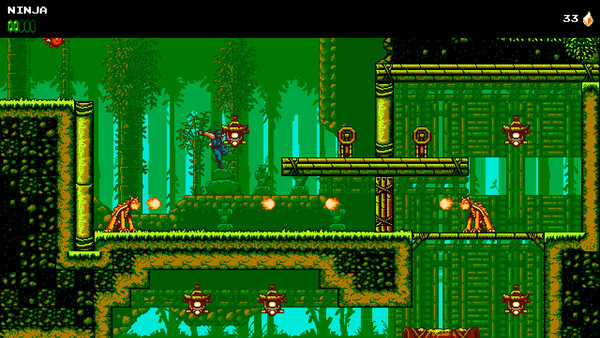
Dear Reader:
The Messenger composer details the process of making two soundtracks in one, game releasing "very soon"
The Messenger doesn't just mesh 8 and 16-bit visuals, it has the sounds to go with it! The game's soundtrack doubles up on every tune by providing 8 and 16-bit versions. In an interview with Nintendo Life, composer Eric W. Brown discusses the crazy amount of work this took.
The Messenger's soundtrack needed to be approached with the same level of authenticity and attention to detail that went into the visual and design elements, so the only way in my mind that this could be done is by using special programs that are built around the limitations of the sound chips of yore. I don't mess around when it comes to authentic chiptune, and I can spot a fake from a mile away... but I'm not here to discuss the morality of "fake" chiptune so I'll just tell you about what works for me.
It was not as simple as writing a song in an "8-bit style" and then slapping a new skin on it for a 16-bit facelift; each track was programmed from the ground up twice, using two different programs, which are able to output files suitable for playback on the original consoles themselves.
The 8-bit music was written in a program called 0cc-Famitracker, which is a modified version of the original Famitracker program with a few subtle differences. I utilized the VRC6 expansion chip (found in some Japanese games like Akumajou Densetsu, the JP version of Castlevania 3) which gave me three additional channels of polyphony to play around with.
For the 16-bit side, I used a program called Deflemask, a multi-chip tracker with Genesis sound support. Defle also has the NES chip as an option but does not have VRC6 support, hence the need to use two different programs. I should mention these programs are all in active development and free to download and use, with a community of users around the world.
After exporting finished songs from each program, there are inconsistencies in the overall volume of the track as well as a few milliseconds of silence at the start of the NES tracks, so I had to line them up in Logic to make sure the loops were seamless, and throughout the course of the project I was working on my mastering chain to level out volumes and tame some of the harsher frequencies before exporting the final version of what ends up in the game.
I grew up as a Genesis kid so it will forever be one of my favourite sound palates, making the decision to go for a Genesis-style 16-bit soundtrack a no-brainer. With a few exceptions, I had the majority of the soundtrack written in 8 before I moved on to 16, but from there I would keep both programs open and just work on copying over one channel at a time until all the notes were in there from top to bottom, then go back around and tweak instrument settings and add effects to make it sound more like music.
I used these same programs to make all the sound effects in the game as well. Between using two different trackers on PC, audio software on Mac, and then back to PC for uploading into the backend, no doubt it was a lot of time-consuming file juggling but it's all worth it to get it done right!
Wondering when you can get your hands on The Messenger? The dev team says that the game is coming, “very soon, probably sooner than you would think!"

